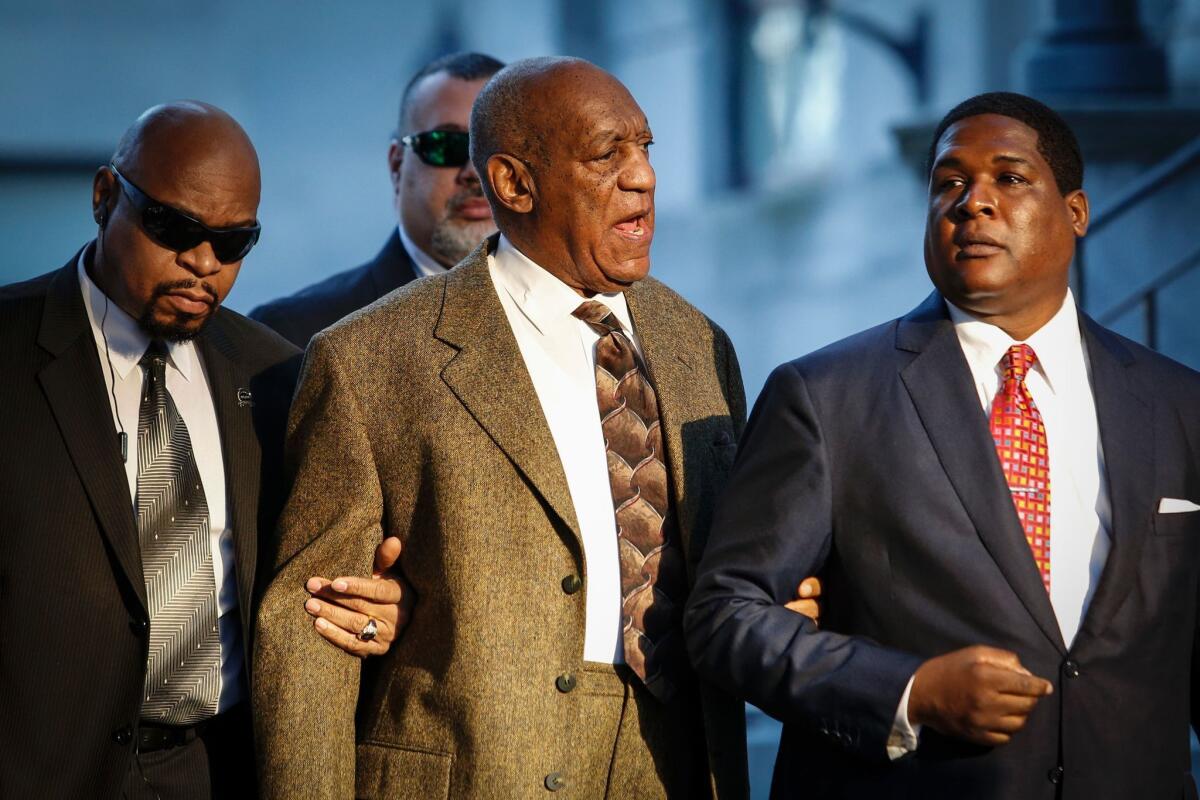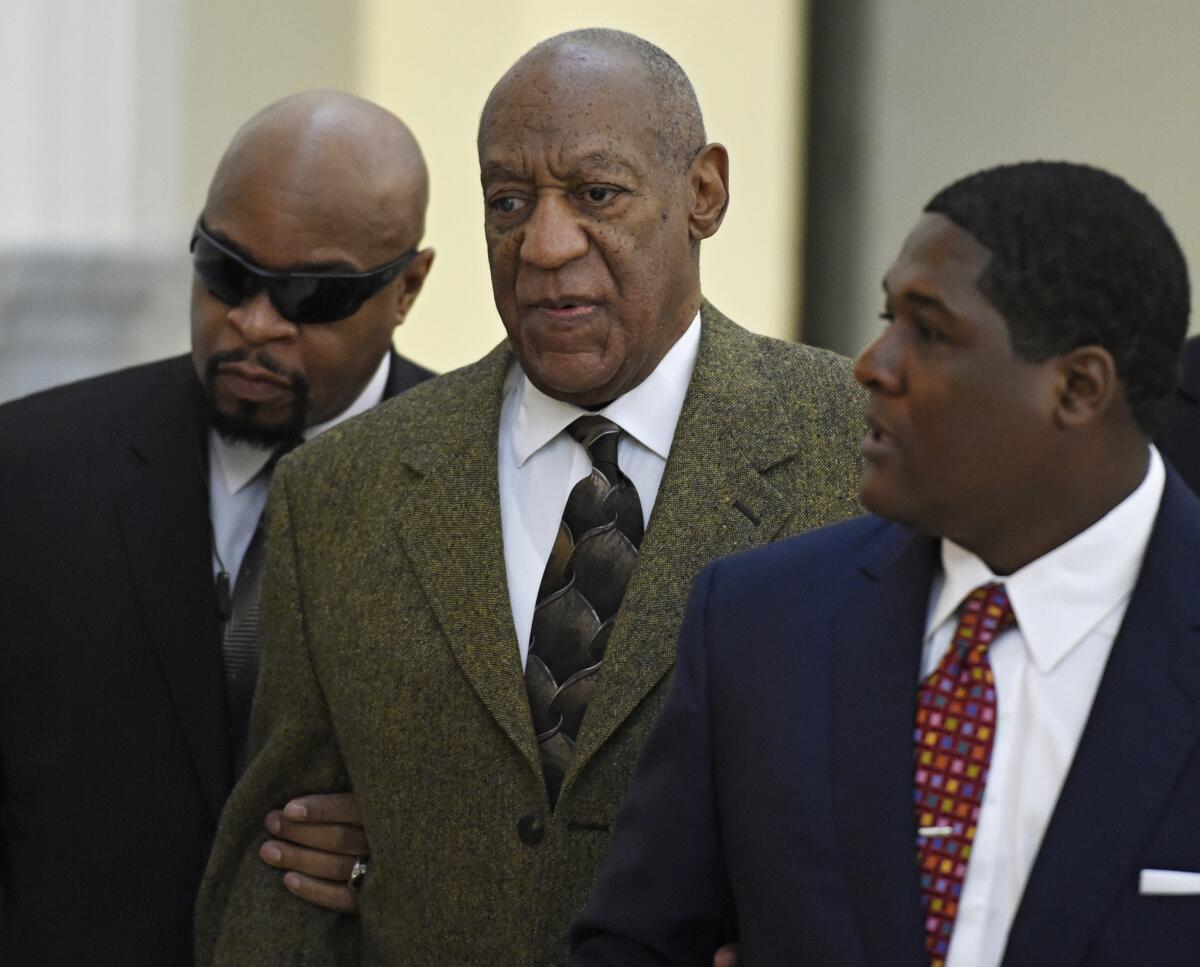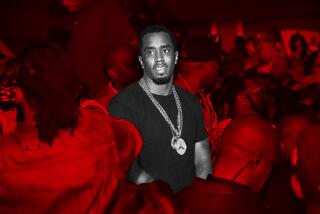Prosecutors in Bill Cosby hearing pound away at ex-D.A. and alleged non-prosecution pact

Bill Cosby arrives at court in Norristown, Pa., on Tuesday.
Reporting from NORRISTOWN, PA. — Bill Cosby made his first significant courtroom appearance since being charged with sexual assault five weeks ago.
But much of the drama at a hearing Tuesday centered on another polarizing figure: former Montgomery County Dist. Atty. Bruce Castor, a onetime Cosby investigator who is now testifying for the defense.
Cosby’s lawyers put Castor on the stand to support their claim that in 2005 he and Cosby’s late attorney Walter Phillips had entered into a non-prosecution pact. The defense is seeking a dismissal of the charges based on that alleged agreement.
Prosecutors challenge such a deal was made and say they are not bound by it.
Cosby, 78, is charged with three counts of aggravated indecent assault, a second-degree felony, for a 2004 encounter involving drugs and alcohol with former Temple University basketball staffer Andrea Constand.

Bill Cosby arrives at court. The entertainer’s attorneys are trying to derail a criminal case against him.
But far from getting into salacious details, Tuesday’s proceedings centered on the minds of lawyers. Castor’s testimony relied on an involved legal theory in which he said he deliberately shut down the possibility of a criminal trial — with the so-called agreement — because he wanted to deprive Cosby of any 5th Amendment protection should Constand bring a civil lawsuit.
The claim of a non-prosecution agreement also hinged on a news release Castor issued in 2005 that the defense says makes such a pact clear and binding.
Cross-examination on the subject, however, veered toward the snippy. “Please, tell me in the press release where you made [an agreement] absolute,” Assistant Dist. Atty. M. Stewart Ryan said after Castor intimated as much.
“I will if you quiet down and let me look at it,” Castor fired back.
For his part, Cosby appeared lighthearted and relaxed at the start of the proceedings but grew more serious as the day wore on, often resting his chin in the crook of his palm or staring intently at Castor as he offered testimony.
Prosecutors hammered away at Castor on the ambiguous language in the news release. At the end of Castor’s testimony, the presiding judge, Steven O’Neill, directed some of his own skepticism at the witness, questioning why, if an agreement existed, there was no concrete evidence of it.
“If you felt there was an agreement, why did you not put it into writing?” O’Neill said to Castor. “Why did you not do that if your intention was to bar prosecution for all time? I mean, do you know why you didn’t do that?”
If the judge rules against the defense, the Cosby case could move down a path, however windingly, to a jury trial.
At stake is more than just the reputation of a show business icon. The Cosby case has, according to some, become a cautionary tale of privilege and sexism.
After decades as the country’s patron saint of family foibles, Cosby has been buffeted over the last 15 months by allegations from women, now numbering more than 50, who say the comedian initiated unwanted sexual contact, often after plying them with drugs or alcohol. The statute of limitations on most cases has run out. But the Constand-related charges were filed just shortly before a 12-year deadline.
According to the Montgomery County complaint, the Canadian athlete struck up what she believed to be a protege-mentor relationship with Cosby in the early 2000s. In 2004 she visited Cosby’s home in Cheltenham, Pa., to talk about her future.
After some diverting conversation, Cosby urged the athlete to drink wine despite her objection that she hadn’t eaten. When she described feeling stressed, he also brought out unidentified pills that he characterized to Constand as his “friends” then pressed her to take them, the complaint says.
After she did, the filing says, Cosby proceeded to penetrate Constand vaginally with his fingers and engage in other nonconsensual contact. Cosby’s defense, led in court Tuesday by Brian McMonagle, has said the contact was consensual.
Yet for all the graphic details, it may be another factor that shapes Cosby’s fate: local politics.
The prosecution is led by newly elected Montgomery County Dist. Atty. Kevin Steele, who defeated Castor in a bitterly fought November election — in part on a campaign vow to prosecute Cosby. Steele on Tuesday remained largely quiet as Ryan led the cross-examination.
Meanwhile, Castor, who over his career has earned both supporters and detractors for his swagger, is thought to be unenthusiastic about the idea of a rival making progress on a case in which he was unwilling, or unable, to bring charges.
By early Tuesday, representatives of dozens of news outlets had descended on the courthouse in this town 20 miles northwest of central Philadelphia. The streets, dotted with low-key restaurants and businesses, were packed with TV news vans, their satellite equipment poking high into the air. Camera operators camped out on a lawn, trading rumors about the celebrity defendant’s arrival. Helicopters circled overhead.
The entertainer hopes to avoid a messy public trial that will put the details of his interactions with Constand under a media microscope. Cosby has already seen his star dim in Hollywood. Entities such as Netflix and NBC shelved projects with the comedian in 2014, though he continued to tour well into last year.
Part of the reason the case is now stronger than when Castor was in office (he left after eight years in 2008) has to do with the unsealing last summer of a deposition in the civil lawsuit that Constand brought against Cosby. The newly released material includes Cosby’s admission that he previously obtained Quaaludes to facilitate having sex with women. Cosby settled Constand’s lawsuit in 2006.
The hearing is scheduled to resume Wednesday, and O’Neill could rule in the afternoon.
Though the proceeding is designed primarily to determine the question of a non-prosecution agreement, the defense pressed forward — often over the objection of prosecutors — to create holes in the larger case.
From the stand, Castor offered his own doubts. Although he may be personally inclined to believe Cosby’s guilt, he said, he thought a number of factors, such as Constand’s delay in bringing the initial complaint, would hamper prosecution.
Castor’s presence as a weapon of sorts against his former office was a surreal touch on a day that, with numerous mentions of “Cosby” as a kind of abstraction, was filled with them. Though Castor was there to bolster the case of the defense, for instance, he took one opportunity to remind the room of where his allegiance lies.
“Let’s be clear, Mr. McMonagle,” he said when the Cosby attorney pushed him on a point. “I’m not on your team here,” he added as he turned toward the prosecution. “I want them to win.”
steve.zeitchik@latimes.com
MORE ON BILL COSBY:
Twitter reacts to Bill Cosby ‘defamation’ countersuits
Bill Cosby’s fans and foes take to social media after assault charge
Bill Cosby’s sexual assault scandal moves from the court of public opinion to the court of justice
More to Read
Sign up for Essential California
The most important California stories and recommendations in your inbox every morning.
You may occasionally receive promotional content from the Los Angeles Times.











